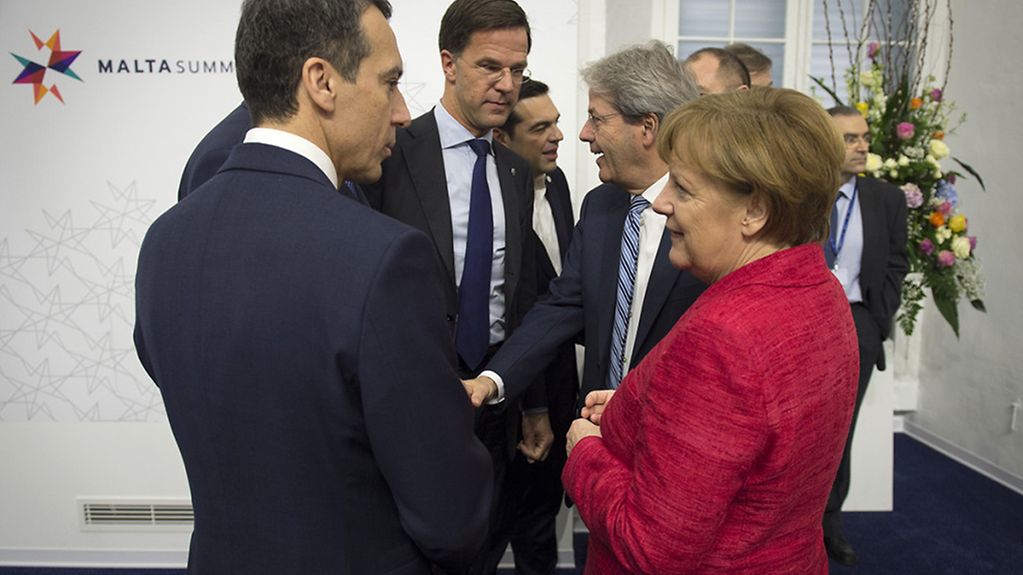EU summit in Malta
In Valletta, the EU heads of state and government have adopted a ten-point plan on migration. Their second working session then focused on the common future of the EU. "Europe’s fate is in its own hands," said Chancellor Angela Merkel.

« L’Europe a son destin entre les mains », a déclaré la chancelière fédérale.
Photo: Bundesregierung/Bergmann
What was decided?
The heads of state and government adopted a ten-point plan on migration. In future the EU intends to step up cooperation with Libya. There are plans to support organisations, regions and local authorities in Libya. Funding will be provided for this purpose.
The number of refugees entering Europe is steadily declining. But every year more refugees are drowning in the Mediterranean. In 2016 alone there were 4,600 deaths.
The Libyan coastguard is to receive training to help them prevent refugee boats from attempting the life-threatening crossing. The maritime Operation SOPHIA will play a supporting role in protecting Libyan territorial waters.
At the Libyan coast adequate reception capacities and conditions for migrants are to be put in place in conjunction with the UN Refugee Agency (UNHCR) and the International Organization for Migration (IOM).
With a view to the Central Mediterranean route, Chancellor Angela Merkel noted, "Work on displacement and migration is now beginning to take form." The aim is still to combat illegal migration and the mafia-like structures involved. Angela Merkel pointed to the migration compacts already agreed with African states, but conceded that a lot of work still lies ahead.
Acting together in the world
The heads of state and government discussed the role of Europe in the world over lunch. Summit participants drew attention to their shared fundamental values and their commitment to multilateralism, reported Angela Merkel.
They had agreed that the EU should endeavour to negotiate more free trade agreements. Europe, she said, must act together. "Our fate is in our own hands," declared the Chancellor.
On the basis of shared values, the EU will seek transatlantic cooperation, said Angela Merkel. There will be points "on which we agree, including the fight against international terrorism". And there will be points on which there is no agreement. The fight against terrorism does not justify a general suspicion against all people from a certain region, or all people of a certain faith.
60th anniversary of the EU – review or view to the future?
At a second working session, the 27 EU states (without the British Prime Minister Teresa May) discussed the future development of the EU. On 25 March, in Rome, the European community will celebrate the 60th anniversary of the signing of the Rome Treaties.
The heads of state and government discussed what sort of statement they intend to adopt to mark the anniversary. For the next ten years or so "we want to say what direction we will be heading in and how we will proceed" explained Angela Merkel after their deliberations. The Bratislava Agenda will be one element.
Over and above this, it is a question of how the EU sees its role in the world, the Chancellor continued. "What contribution does the EU intend to make to globalisation? What alliances does it want to be part of? How does it view multilateral cooperation?"
Angela Merkel reasserted her view that there will be a multi-speed European Union, "in which not all member states are always at the same level of integration".
Finally the Chancellor stressed, "Today we have seen a spirit of togetherness, that focused strongly on the future. It was thus a continuation of what we, the 27 member states, discussed in Bratislava."